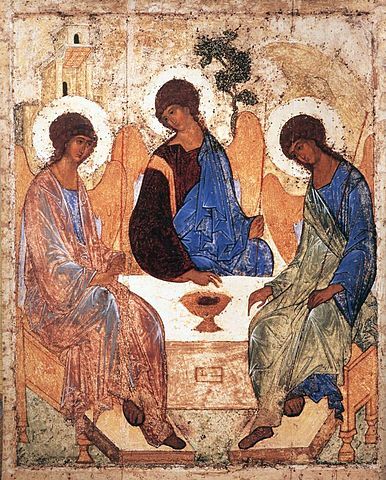Όπως ακριβώς δεν έχουν καμιά ωφέλεια οι γεωργοί που σπέρνουν το σπόρο στο δρόμο, έτσι ούτε κι εμείς έχομε κανένα όφελος από το να μας ονομάζουν Χριστιανούς, αν τα έργα μας δεν είναι σύμφωνα με το όνομά μας. Και αν θέλετε να σάς παρουσιάσω αξιόπιστο μάρτυρα τον αδελφόθεο Ιάκωβο που λέγει, η πίστη χωρίς τα έργα είναι νεκρή (Ιακ. 2,17). Άρα λοιπόν παντού είναι αναγκαία και η εκτέλεση των έργων γιατί όταν απουσιάζουν αυτά, δεν μπορεί να μας ωφελήσει η ονομασία του Χριστιανού. Και μη απορήσεις. Γιατί, πες μου, ποιο κέρδος έχει ο στρατιώτης από την κατάταξη του στο στρατό, αν δεν είναι άξιος για την εκστρατεία και δεν πολεμά για τον βασιλιά από τον οποίο τρέφεται;
Ίσως, αν και είναι φοβερό το λεγόμενο, θα ήταν προτιμότερο να μη στρατευθεί, παρά να στρατευθεί και ν' αμελεί για την τιμή του βασιλιά γιατί, πως δεν θα τιμωρηθεί αυτός που τρέφεται από το βασιλιά, αλλά δεν αγωνίζεται για το βασιλιά; Και τι λέγω για το βασιλιά; μακάρι να φροντίζαμε έστω και για τις ψυχές μας.
Και πως, λέγει, μπορώ να ζω μέσα στον κόσμο και ανάμεσα στα κοσμικά πράγματα και να σωθώ; Τι λες, άνθρωπε; Θέλεις με συντομία να σου δείξω ότι δεν είναι ο τόπος που σώζει, αλλά ο σωστός τρόπος ζωής και η προαίρεση; Ο Αδάμ έπαθε το ναυάγιο σαν σε λιμάνι μέσα στον παράδεισο (Γεν. 3) ο Λωτ πάλι διασώθηκε σαν σε πέλαγος μέσα στα Σόδομα (Γεν. 19)· ο Ιώβ πέτυχε τη δικαίωση επάνω στην κοπριά (Ιώβ 2), ενώ ο Σαούλ, αν και ζούσε μέσα στους θησαυρούς, έχασε και την εδώ βασιλεία και την εκεί (Α' Βασ. 18)...
Γνωρίζοντας αυτά και φέρνοντας στη μνήμη μας τη φοβερή ημέρα και σκεπτόμενοι το πυρ εκείνο και τα φοβερά κολαστήρια, ας επιστρέψομε από το πλανεμένο δρόμο μας. Γιατί θα ρθεί ώρα που θα διαλυθεί το θέατρο του κόσμου αυτού δεν είναι δυνατό μετά το πέρας αυτής της ζωής να κάνει κανείς κάτι, δεν είναι δυνατό να στεφανωθεί μετά τη διάλυση του θεάτρου.
Αυτός είναι ο καιρός μετανοίας, ενώ εκείνος κρίσεως, αυτός είναι ο καιρός των αγώνων, ενώ εκείνος των στεφάνων, αυτός είναι ο καιρός του κόπου, ενώ εκείνος της ανέσεως, αυτός ο καιρός των καμάτων, ενώ εκείνος της ανταποδόσεως. Συνέλθετε, παρακαλώ, αφυπνισθείτε και ας ακούσομε με προθυμία τα λεγόμενα. Ζήσαμε για τη σάρκα, ας ζήσομε και για το πνεύμα, ζήσαμε για τις ηδονές, ας ζήσομε και για τις αρετές, ζήσαμε με αδιαφορία, ας ζήσομε και με μετάνοια. Γιατί υπερηφανεύεται το χώμα και η στάχτη; (Εκκλ. 10, 9). Τι φουσκώνεις από αλαζονεία, άνθρωπε; γιατί μεγαλοφρονείς για τον εαυτό σου; τι ελπίζεις από τη δόξα του κόσμου και τον πλούτο;
Ας πάμε, παρακαλώ, στους τάφους και ας δούμε τα εκεί μυστήρια, ας δούμε τη φύση την ανθρώπινη κατασκορπισμένη, τα κόκκαλα σαπισμένα, τα σώματα σάπια κι αν ακόμη είσαι σοφός, σκέψου, κι αν είσαι φρόνιμος, πες μου, ποιος είναι εκεί ο βασιλιάς και ποιος ο ιδιώτης, ποιος είναι ο ευγενής και ποιος ο δούλος, ποιος ήταν ο σοφός και ποιος ο άσοφος;
Που είναι εκεί η ομορφιά της νεότητας; που το χαρούμενο πρόσωπο; που τα όμορφα μάτια; που η καλοκαμωμένη μύτη; που τα φλογερά χείλη; που τα κάλλη των παρειών; που το λαμπερό μέτωπο; δεν είναι όλα σκόνη; δεν είναι όλα σκουλήκια και δυσωδία; δεν είναι όλα βρωμιά;
Σκεπτόμενοι, αδελφοί, αυτά και φέροντας στη μνήμη μας την τελευταία ημέρα, όσο ακόμη έχομε καιρό, ας επιστρέψομε από τον πλανεμένο δρόμο μας. Με τίμιο αίμα αγορασθήκαμε (Α' Πέτ. 1,2). Γι' αυτό ο Θεός φανερώθηκε επάνω στη γη.
Ο κριτής οδηγείται στο δικαστήριο για τους καταδικασμένους, η ζωή γεύεται θάνατο, ο πλάστης ραπίζεται από το πλάσμα,εκείνος που δεν τον βλέπουν τα σεραφείμ, φτύνεται από το δούλο, γεύεται ξύδι και χολή, κεντάται με τη λόγχη, τοποθετείται στον τάφο, και συ, πες μου, αδιαφορείς και κοιμάσαι και τα περιφρονείς, άνθρωπε, όλα αυτά;
Δεν γνωρίζεις, ότι κι αν ακόμη χύσεις το αίμα σου για Εκείνον, ούτε έτσι έκαμες εκείνο που πρέπει; Και τούτο γιατί άλλο είναι το αίμα το δεσποτικό και άλλο το αίμα του δούλου. Πρόλαβε με τη μετάνοια και τη μεταστροφή την έξοδο της ψυχής, μήπως έρθει ο θάνατος και δεν καταστεί δυνατή η θεραπεία με τη μετάνοια, γιατί στη γη έχει τη δύναμη της η μετάνοια, και μόνο στον άδη αυτό δεν είναι δυνατό να συμβεί.
Ας ζητήσουμε τον Κύριο όσο έχομε καιρό· ας κάνομε το καλό, ώστε και από τη μέλλουσα αθάνατη γέεννα ν' απαλλαγούμε και ν' αξιωθούμε την ουράνια βασιλεία, με τη χάρη και τη φιλανθρωπία του Κυρίου μας Ιησού Χριστού, στον οποίο ανήκει η δόξα και η δύναμη, στους αιώνες των αιώνων.



